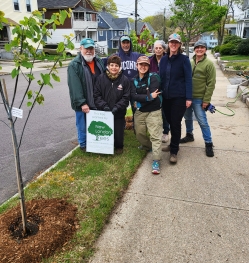
When my kids were little, they delighted in catching my attention by surprise, and then shouting, “Made you look!”
Perhaps billionaire Bill Gates was playing that game at a September 2023 conference when he called tree planting for carbon capture “complete nonsense.” He also said, “I don’t plant trees,” at a Climate Forward event held by the New York Times.
His comments certainly caught my attention. Based on the number of publications reporting his comments, many other people looked, too.
Let's talk to a couple of real tree experts.
“Indeed, trees alone can't absorb enough carbon dioxide to stop climate change,” says Maggie Redfern, director of the Connecticut College Arboretum and founder of the volunteer group New London Trees. “Trees, however, support many natural systems. That's especially true of native trees."
Getting straight to the point, Shirley McCarthy of Branford, CT, says that anyone who believes tree planting is nonsense, “doesn't know what they’re talking about.” McCarthy co-founded Branford’s Community Forestry Commission in 2009.
Like Redfern, McCarthy knows native trees support our ecosystems, but she’s better positioned than most to understand their relationship with human health. McCarthy is a professor emeritus at Yale School of Medicine.
“There’s so much known today about the relationship between trees and human health,” says McCarthy, “From blood pressure to asthma to improved immune function, we are better off with trees in our environment.”
She points to several well-designed studies that illustrate this point. “For example, research shows the more trees in a neighborhood, the lower the residents' mortality rate. It lowered even more as trees got older and bigger. Conversely, fewer trees in a neighborhood correlate with increased premature mortality rates.”
If you’re curious about tree research, McCarthy suggests the University of Washington page that lists summaries and citations.
See a list of my four favorite tree selection resources, and the complete article, at Zip06.com.
